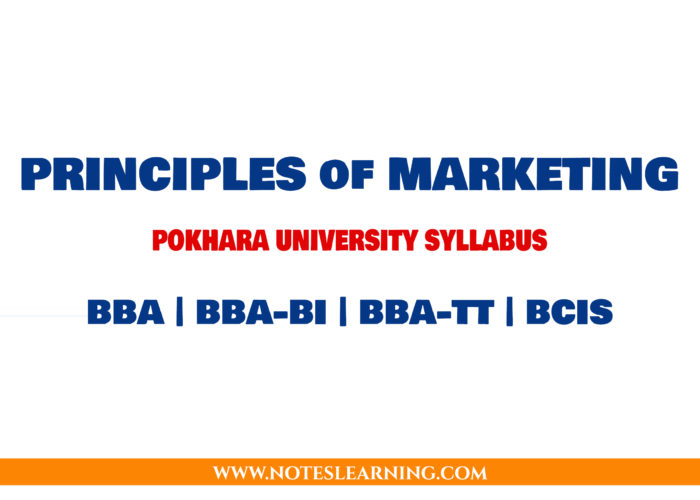This is the syllabus for the course “Principles of Marketing” offered by Pokhara University. This course remains valid for the following courses and semesters.
| BBA | Fourth Semester |
| BBA-BI | Fifth Semester |
| BBA-TT | Sixth Semester |
| BCIS | Sixth Semester |
| Course Title | Principle of Marketing (POM) |
| Course Code | MKT 241 |
| Credit Hours | 3 |
| Course Objective | POM is the foundation course on marketing. This course aims to build students’ understanding of the marketing processes and principles. Through this course, students also acquire skills to design marketing strategies for SMEs. |
| Course Description | The course focuses on the operation of the marketing function in a dynamic and competitive environment. This course deals comprehensively on issues of emerging marketing practices and challenges, the dynamics of the marketplace , and designing of marketing mix. The course includes topics that help students to understand marketing mix. The course also includes topics that help students to understand marketing process and environment, information systems and buyer behavior, segmentation, targeting, and positioning strategies, and strategies related to marketing mix variables. |
| Course Contents | |
| Unit I | Marketing and Marketing Environment (12 hours) |
| Introduction to Marketing and Marketing Management: Meaning of marketing; Evolution of the marketing philosophies (concepts); Basic principles of the marketing concepts and holistic marketing concept. Meaning and tasks of marketing management. Marketing in the Contemporary World: Marketing challenges of the 21st century and firms’ responses to the challenges; Concept, relevance and practices of relationship marketing , green marketing, e-marketing, pyramid (C2C) marketing and rural marketing. Marketing Mix: Components of the marketing mix for products and services Marketing Environment: Meaning and scope of marketing environment; Micro and Macro environment variables; Reactive and Proactive marketing. Marketing Environment in Nepal | |
| Unit II | Marketing Information System and Buyer Behavior (10 hours) |
| Marketing Information System: Concept and relevance; Components of the marketing information system; Marketing research areas and process Buyer Behavior: Organizational buyer behavior- buying process and influencing factors. Consumer behavior -buying process and influencing factors; consumer movement and consumer protection | |
| Unit III | Segmentation, Targeting and Positioning Strategies (4 hours) |
| Segmentation: Concept, process and requirements; Level of segmentation; Bases for segmenting consumer and organizational markets Targeting: Segment evaluation, analysis and selection Positioning: Concept and types of positioning; Product positioning process | |
| Unit IV | Product, Pricing, Distribution and Promotion Strategies (22 hours) |
| Product: Concept and levels of the products; Product classifications; Product life cycle stages and strategies; New product development process; Branding strategies- branding objectives, types of brand, and concept of brand equity; Packaging: Functions and levels of packaging; essentials of a good package; Product line and mix strategies; Service product strategies: service marketing concept, characteristics of services and marketing strategies; management of people, physical evidences, and process Pricing: Concept of price and pricing; Importance of pricing; Internal and external price factors; Pricing approaches – cost based, demand based, value based and competition based approaches; New product pricing; price lining, price adjustments, initiating and responding to price changes Distribution: Concepts and objectives ; Channel functions; channel designs for consumer and industrial products; channel selection factors; Channel conflicts and their resolutions. Marketing Logistics: Concept, nature and objectives; major logistics functions- transportation, warehousing, inventory management, order processing, and customer services decisions. Promotion: Concept; Marketing communication process and systems; promotion mix components; promotion mix determination factors. Advertising: Nature and objectives; Advertising budgeting approaches; Advertising message design factors; advertising media selection factors. Personal selling: Nature and relevance of personal selling; Types of personal selling. Sales Promotions: Nature and objectives; Sales promotion tools and technique. Public Relations; Nature and objectives; Tools of public relations. Direct marketing: concept and relevance; Methods of direct marketing | |
| Basic Texts | Principles of Marketing: South Asian Perspective | New Delhi | Prentice Hall of India | Kotler, Philip, Gary Armstrong, Prafulla Agnihotri and Ehsan ul Haque | |
| References | Koirala, K.D. | Principles of Marketing | Buddha Academic Publications |Kathmandu Kamarulzaman, Yusniza and Nor Khalidah Abu | Principles of Marketing | Oxford University Press | Delhi |

